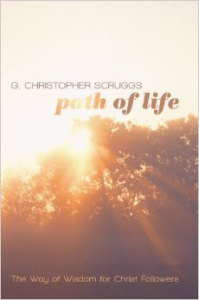The purpose of this blog is not to sell books, but this post is about two writing endeavors connected to the search for the wise and loving life. This spring, I published a book, Path of Life The Way of Wisdom for Christ Followers. Our congregation decided to turn the book into an eight-week sermon series and church-wide experience. Therefore, I wrote a companion book, Path of Life: A Devotional Study Eight Weeks Living out the Wisdom of God. The devotion was designed to allow those who don’t want to read the book an opportunity to experience its basic lessons by reading no more than one page per day for eight weeks. 
At the very beginning of Path of Life I make a comment that I believe is true: The biggest cause of human misery is a lack of love in early life. Time and time again the pastors of ours and other congregations see the results of people not receiving unconditional love at an early age. However, the second biggest cause of human misery we see is poor decision-making. Unfortunately, the weakness of American families combined with our cultural lack of respect for elders and for the experience of prior generations result in people making seriously flawed decisions in a number of important areas of life.
Path of Life is a sixteen-chapter book that seeks to introduce a reader to the importance of wisdom literature and the need to seek wisdom in every day life. The chapter headings are as follows:
Chapter One: What is Wisdom?
Chapter Two: The Source and Use of Wisdom
Chapter Three: The Heart Attitude of the Wise
Chapter Four: A Real, Personal Wisdom
Chapter Five: The Parental Voice of Wisdom
Chapter Six: The Two Ways
Chapter Seven: The Faithful Lover
Chapter Eight: Where Wisdom Grows
Chapter Nine: The Life of Self-Control
Chapter Ten: The Life of Labor
Chapter Eleven: Life in Community
Chapter Twelve: Does Wisdom Matter?
Chapter Thirteen: The Problem of Suffering
Chapter Fourteen: The End of Understanding
Chapter Fifteen: One Greater Than Wisdom
Chapter Sixteen: Wisdom and our Time
The eight-week study looks at Biblical wisdom in a number of areas and seeks to help people with a number of questions of life. It begins with orienting us to the importance of faith, a humble spirit, and respect for God as the only way we will ever achieve true wisdom.
The second week focuses on choices. We all make a few basic choices in life concerning what kind of people we will be and what we will value. These choices determine our character. Wisdom literature urges human beings to choose the path of faith, wisdom and righteousness as fundamental anchors for all decisions.
The third week concentrates on relationships. To be human is to in relationship with other people. One key to happiness and fulfillment is to have healthy relationships with honest, honorable people.
The fourth week covers wisdom and work. Hard work is essential for happiness and security in this life. However, Biblical wisdom warns against placing our confidence in possessions and devoting our entire lives to accumulating wealth. To live wisely and well, we must learn to work, to save, and to give.
Week Five covers the virtue of generosity. How we manage our money is an important part of life, and we cannot manage our finances in a Christian manner without developing the virtue of generosity.
Suffering is an inevitable part of human life. Week Six focuses on the Book of Job and on a Christian response to the problem of suffering. How we confront suffering is important to whether we find a kind of happiness as Christians that the world cannot provide.
Where and how can a person find meaning in Life? The book of Ecclesiastes is about the problem of meaning and purpose in life. What gives life meaning? Accomplishments? Work? Pleasure? Honor? Wealth? Week Seven deals with the problem of the meaning of life and how we can find meaning in out day-to-day lives.
Finally, in confusing, chaotic, and difficult times, people have always sought to understand the future. People as questions like, “How will my life end?” and “Where is human history going?” Week Eight focuses on the Book of Daniel and the wisdom we get from thinking about the end of our lives and of history. If we cannot know, as Jesus says, the day or the hour of our own death or of the end of history, what can we know that will give us faith and courage to confront the problems of our day and time.
 Naturally, no one book or one Bible study can answer all the questions people have about how to live wisely. Learning to live wisely is the work of a lifetime. What a single book can do is set out a basic orientation to the search for wisdom and seek to answer a few fundamental questions. These books are designed to help people begin a lifetime journey on what wisdom literature calls the “Path of Life.”
Naturally, no one book or one Bible study can answer all the questions people have about how to live wisely. Learning to live wisely is the work of a lifetime. What a single book can do is set out a basic orientation to the search for wisdom and seek to answer a few fundamental questions. These books are designed to help people begin a lifetime journey on what wisdom literature calls the “Path of Life.”

